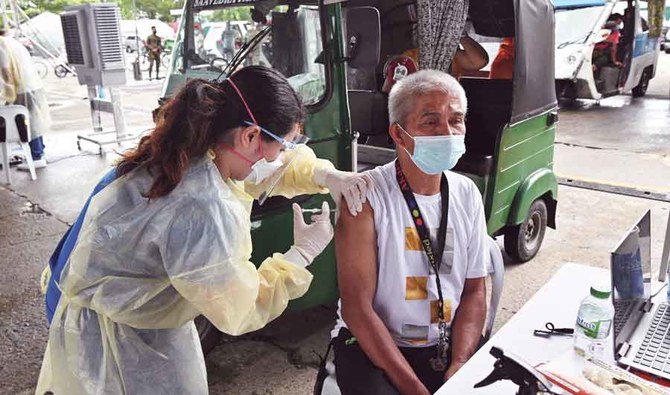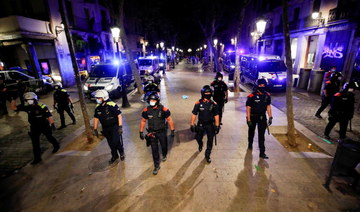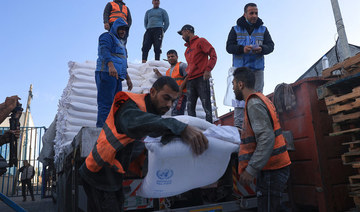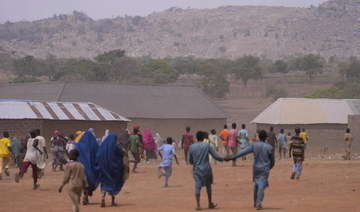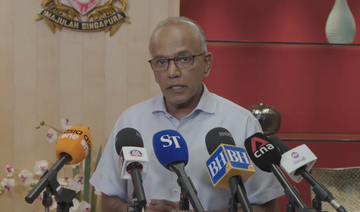MANILA: Philippines President Rodrigo Duterte has warned that the government may revert to tougher coronavirus restrictions to contain the spread of the delta variant in the country.
In a recorded address to the public aired late on Monday night, Duterte cited Department of Health (DoH) data that showed 16 new cases of the delta variant in the country as of July 16.
“That should put us in grave concern,” Duterte said, citing experts’ claims that “this kind of variant is more vicious, more aggressive and fatal.”
He added that compared to the alpha variant, where an individual testing positive for COVID-19 could infect four to five people, a delta-positive person could infect up to eight people.
“So, the total reported local cases in the country is a cause for serious alarm and concern. Again, it’s redundant, but still, it is as good as any warning that can be given to the people. We may need to reimpose stricter restrictions to avoid mass gatherings and prevent superspreader events,” Duterte added.
He said that other countries such as Indonesia, South Korea and Taiwan were forced to enter new lockdowns because of the delta variant.
Earlier, health authorities had said that with the 16 new cases, the total number of delta variant infections in the Philippines stood at 35, of which 11 were locally transmitted, with three deaths reported.
However, in his report to the president, Interior Secretary Eduardo Ano said that the actual number of delta cases in the country might be higher than was reported by the DoH. This, he said, is due to the difficulty in pinpointing real cases through the use of ordinary test kits.
“That’s why we all need to be more careful,” Ano said, giving the assurance that the government had a contingency plan “in case there will be a new surge in COVID-19 cases.”
Duterte said that he hoped “existing infrastructure could cope,” adding that it also depended on whether COVID-19 vaccines “can be as effective in dealing with the delta variant.”
He further urged the interior department and police to implement existing health protocols with “greater urgency and necessity.
“It is only by imposing these restrictions that we can fight the threat of delta variant,” he said.
As per the directive, local governments will implement all the laws, ordinances and community quarantine protocols to ensure public welfare, while border controls will also be strengthened, especially in the country’s international airports and seaports.
“At the same time, local CEOs will also lead the aggressive ‘Prevent-Detect-Isolate-Treat-Reintegrate’ campaign plus vaccination strategy,” Duterte said, adding that the government will also introduce more quarantine, isolation and health facilities.
Meanwhile, Metro Manila mayors have called on the COVID-19 Inter-Agency Task Force (IATF) to suspend its policy allowing children in areas under the general community quarantine to go outdoors, citing the threat posed by the delta variant.
“We (mayors) have met, and we wish to ask the IATF to suspend the policy for children aged five and up here in the region,” Metropolitan Manila Development Authority chair Benhur Abalos told the president.
Experts applauded the move, warning of the risks involved in allowing children outdoors.
“I highly recommend that it should be suspended at this point in time where we don’t yet know the extent of the transmission of the delta variant,” infectious diseases expert Dr. Rontgene Solante told Arab News.
“Despite data showing that most children with COVID-19 don’t manifest with severe coronavirus, only very few, they can be superspreaders when they go back home if they were exposed to the virus outside, especially when they get in contact with elderly people at home or those with underlying conditions who are not yet vaccinated. Then they can be a potential source of the infection,” Solante said.
He further urged the government and the IATF to review the policy.
“They should suspend that policy as soon as possible, especially for now that we continue to monitor the extent of this delta variant. We have identified the primary index cases; the more tedious task now is to identify the secondary contacts,” he said.
However, the health expert added that when compared to other countries in the region, “we’re doing okay.”
Solante said: “If you look at other countries like Indonesia and Thailand, and even Malaysia, they have been experiencing a significant surge of cases, up to 10,000 to 15,000 per day. And if we compare our situation there, then I would say we’re still a bit better with handling the pandemic.”
The DoH on Tuesday reported 4,516 new COVID-19 infections in the country, taking total cases to 1,517,903, while the number of deaths reached 26,844. There are now 46,806 active cases.
“But I would say we should be more careful, we should be more strategic in the way we handle this, because we should also balance the impact on the economy,” Solante added, drawing attention to those flouting health rules.
“There are some people who behave as if the situation is already back to normal. That’s very bad because the way we see it, the experts see it, this will really be a long haul for us, especially since we haven’t vaccinated yet even one-third of the population,” he said.
The Philippines has fully vaccinated more than 4,708,073 people, while 10,388,188 have received their first dose of COVID-19 vaccine, according to DoH data.
Solante said that the country has a “long way to go” with the population of 112 million, reminding the public to comply with health safety protocols “because that’s the first barrier to protect us against this delta variant.”
Similar to Interior Secretary Ano’s observation, Solante said that it is possible “there are more delta variant cases in the country than reported.
“Not only the delta variant, even the UK variant is highly-transmissible. Our problem here are the limitations in conducting genomic analysis, it is not as wide as we would like it to be,” he added, citing the high costs involved.
And because not all laboratories in the country can do the analysis, Solante said that the type of variant could not be pinpointed right away among positive COVID-19 carriers.
“These laboratories still have to send samples to the Philippine Genome Center. So that’s our limitation.”



